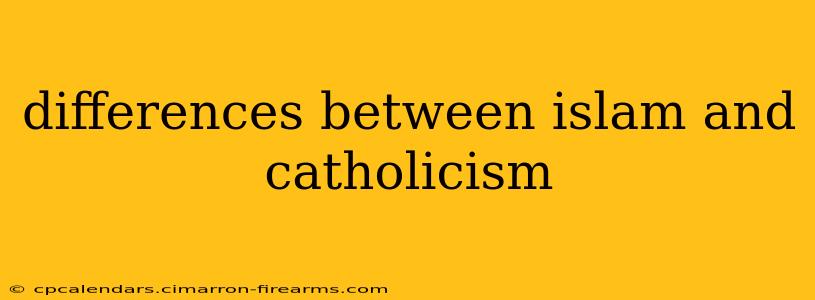Islam and Catholicism, two of the world's largest religions, share some common ground as Abrahamic faiths, yet diverge significantly in their theological beliefs, practices, and historical trajectories. This in-depth comparison explores the core distinctions, aiming to provide a nuanced understanding of both religions.
Core Beliefs: A Foundation of Differences
While both religions are monotheistic, believing in one God, their conceptions of God and his relationship with humanity differ substantially.
The Nature of God:
- Islam: Emphasizes the absolute oneness (Tawhid) of God (Allah), rejecting the Trinity and any concept of divinity shared among multiple beings. Allah is transcendent, utterly separate from creation. The Quran, Islam's holy book, is considered the literal word of God, revealed to the Prophet Muhammad.
- Catholicism: Believes in one God existing in three persons: Father, Son (Jesus Christ), and Holy Spirit – the Holy Trinity. This concept of a triune God is central to Catholic theology. The Bible, comprising the Old and New Testaments, is considered the inspired word of God, interpreted through the lens of Church tradition.
The Role of Jesus Christ:
- Islam: Recognizes Jesus (Isa) as an important prophet of God, born of the Virgin Mary, but not as the Son of God or divine. Muslims believe Jesus was a human messenger, performing miracles through God's power, but he was not crucified.
- Catholicism: Views Jesus Christ as the Son of God, both fully divine and fully human. His crucifixion, death, and resurrection are central to the Christian faith, representing atonement for humanity's sins. Catholics believe Jesus is the Messiah prophesied in the Old Testament.
Practices and Rituals: Divergent Paths of Worship
The daily practices and rituals of Islam and Catholicism reflect their differing theological perspectives.
Worship and Prayer:
- Islam: Five daily prayers (Salat) are obligatory, performed facing the Kaaba in Mecca. Other key practices include fasting during Ramadan, giving charity (Zakat), and making a pilgrimage to Mecca (Hajj) if physically and financially able.
- Catholicism: Mass, the central act of Catholic worship, commemorates the sacrifice of Jesus Christ. Other practices include daily prayer, confession (reconciliation), receiving the Eucharist (Holy Communion), and observing various liturgical seasons throughout the year.
Religious Texts and Authority:
- Islam: The Quran is the ultimate source of religious authority, supplemented by the Sunnah (the Prophet Muhammad's teachings and practices). Islamic jurisprudence (Sharia) provides a legal framework for various aspects of life.
- Catholicism: The Bible, Sacred Tradition (oral and written teachings passed down from the apostles), and the Magisterium (the teaching authority of the Church, primarily the Pope and bishops) are the primary sources of authority.
Social and Ethical Aspects: Contrasting Values and Perspectives
While both religions emphasize ethical conduct, their approaches to social issues and moral principles often differ.
Gender Roles:
- Islam: Traditional interpretations often ascribe distinct gender roles, with women generally having a more restricted public sphere than men. However, interpretations vary widely across different Islamic cultures and communities.
- Catholicism: While traditional Catholic teachings have often emphasized complementary roles for men and women, modern interpretations increasingly advocate for greater equality and the active participation of women in all aspects of Church life.
Religious Law:
- Islam: Sharia law, derived from the Quran and Sunnah, governs various aspects of Muslim life, including family law, criminal justice, and economic practices. The application and interpretation of Sharia vary widely across different Muslim communities.
- Catholicism: Canon law, the body of laws governing the Catholic Church, is distinct from civil law. It regulates Church affairs, but its influence on secular matters is less direct than Sharia in many Muslim societies.
Conclusion: Understanding the Nuances
This comparison highlights some key distinctions between Islam and Catholicism. It’s crucial to remember that both are diverse faiths with internal variations in belief and practice. Generalizations should be avoided, and engaging with specific communities and scholars is essential for a comprehensive understanding of each religion's richness and complexity. Further research into individual theological perspectives within both Islam and Catholicism is highly recommended for a more complete picture.

